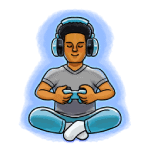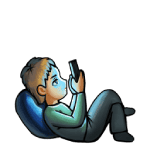The Circadian Rhythm: What It Is, How It Works, and How to Use It to Your Benefit
Author:
 |
Lionel Thomas Father, Gamer and Founder with a Passion for Health, AI, Environment and Gamification of Life. |
Author Tools:
- Grammarly (Spelling and Grammar)
- ChatGPT (Content Enhancements & Research)
- GSpeech (Audio by AI)
- Other Tools (AI)...
Artists:
- Roy Wibowo (Header)
- Lionel Thomas using NightCafe Studio [AI Generated] (Content)
References:
-
1. What Are Biological Rhythms?
WebMD
https://www.webmd.com/a-to-z-guides/what...
Summary:
Biological rhythms, often synonymous with circadian rhythms, are bodily functions regulated by an internal clock, affecting sleep-wake cycles, body temperature, hormone secretion, and more. These rhythms are controlled by the suprachiasmatic nucleus in the brain and can operate on diurnal (night and day), circadian (24 hours), ultradian (less than 24 hours), infradian/circalunar (monthly), or circannual (yearly) cycles. Light exposure significantly influences circadian and diurnal rhythms, although studies show that these rhythms can persist with slight variations even in the absence of environmental cues. Individual chronotypes (like being a night owl or early bird) affect these rhythms too. Disruptions in biological rhythms, such as from jet lag, shift work, or irregular sleep patterns, can impact health, including metabolism, heart rate, blood pressure, and mental well-being. Maintaining consistent sleep-wake times, getting sunlight exposure, regular exercise, and avoiding caffeine and artificial light in the evening can help synchronize these rhythms.
-
2. Circadian Rhythms
National Institute of General Medical Sciences
https://nigms.nih.gov/education/fact-she...
Summary:
Circadian rhythms are 24-hour cycles of physical, mental, and behavioral changes in organisms, influenced by light and darkness, crucial for regulating sleep, hormone release, appetite, digestion, and body temperature. Coordinated by the suprachiasmatic nucleus in the brain, these rhythms are synchronized across the body's tissues and organs. Disruptions in circadian rhythms due to factors like genetic variations, neurological diseases, and lifestyle factors such as jet lag and shift work can lead to health issues including sleep disorders, obesity, and heart problems. Groundbreaking research, including Nobel Prize-winning studies on fruit flies, has revealed key proteins like PER, which regulate these rhythms through feedback loops. Ongoing research using organisms like microorganisms and mice, aided by techniques like CRISPR genome editing, is deepening our understanding of circadian rhythms, aiming to develop treatments for their dysfunction and further explore their genetic underpinnings.
-
3. Overview of circadian rhythms
National Library of Medicine
https://pubmed.ncbi.nlm.nih.gov/11584554...
-
4. The role of clock genes in sleep, stress, and memory
Science Direct
https://www.sciencedirect.com/science/ar...
-
5. How does the skin sense sunlight? An integrative view of light sensing molecules
Science Direct
https://www.sciencedirect.com/science/ar...
-
6. The Impact of Sleep and Circadian Disturbance on Hormones and Metabolism
National Library of Medicine
https://www.ncbi.nlm.nih.gov/pmc/article...
-
7. Interaction between circadian rhythms and stress
National Library of Medicine
https://www.ncbi.nlm.nih.gov/pmc/article...
-
8. Get in Touch With Your Circadian Rhythm
WebMD
https://www.webmd.com/sleep-disorders/fi...
-
9. Physiology, Circadian Rhythm
National Library of Medicine
https://www.ncbi.nlm.nih.gov/books/NBK51...
-
10. Sleep and Teens
UCLA Health
https://www.uclahealth.org/medical-servi...
-
11. Why Do We Need Sleep?
Sleep Foundation
https://www.sleepfoundation.org/how-slee...
-
12. Health implications of disrupted circadian rhythms and the potential for daylight as therapy
National Library of Medicine
https://www.ncbi.nlm.nih.gov/pmc/article...
-
13. Why your sleep and wake cycles affect your mood
Harvard Medical School
https://www.health.harvard.edu/blog/why-...
-
14. Circadian Rhythm: Disorders Causes and Risk Factors
National Library of Medicine
https://www.nhlbi.nih.gov/health/circadi...
Summary:
Circadian rhythm disorders, caused by a misalignment of the sleep-wake cycle with the environment, are influenced by genetic, environmental, and lifestyle factors. Genetic conditions like Smith-Magenis syndrome can disrupt melatonin production, impacting sleep patterns. Individuals' natural sleep tendencies, determined by genetics, vary, influencing their susceptibility to disorders like jet lag or shift work disorder. Risk factors include age (teens and older adults are more prone to different disorders), work environment (night shifts, frequent travel), family history, and lifestyle habits like alcohol or caffeine use, exposure to artificial light, and unhealthy sleep habits. Medical conditions affecting mental health, brain function, or eyesight also contribute. Hormonal changes in women during pregnancy, childbirth, or menopause can further affect sleep. Preventative measures, tailored to life stages or work conditions, include managing light exposure, adjusting sleep schedules, and lifestyle changes.
-
15. What Is Cortisol?
WebMD
https://www.webmd.com/a-to-z-guides/what...
Summary:
Cortisol, known as the body's main stress hormone, is crucial in managing various bodily functions. Produced by the adrenal glands, it regulates the use of carbohydrates, fats, and proteins, controls inflammation, blood pressure, blood sugar levels, and the sleep/wake cycle, and boosts energy in response to stress.
-
16. Preliminary evidence that light through the eyelids can suppress melatonin and phase shift dim light melatonin onset
National Library of Medicine
https://pubmed.ncbi.nlm.nih.gov/22564396...
-
17. When Is the Best Time To Go to Sleep?
Cleveland Clinic
https://health.clevelandclinic.org/what-...
Summary:
The best time to go to sleep isn't a one-size-fits-all, as individual needs vary, according to sleep disorders expert Dr. Colleen Lance. A UK study suggested 10 p.m. as an ideal time, but Dr. Lance emphasizes the importance of personal needs and consistency rather than a specific hour. Consistently going to bed and waking up at the same times daily, including regular meal times, aligns with our circadian rhythm, improving sleep quality. Adults should aim for 7-9 hours of sleep per night, cycling through various sleep stages, including REM sleep, important for brain rest. Inconsistent sleep cycles can increase risks for obesity and diabetes. Tips for better sleep include eating dinner at the same time each night, avoiding late-night snacks, considering small doses of melatonin, using a sleep diary, eliminating naps, and minimizing evening alcohol or caffeine. Consistency in sleep routines, like those we set for children, is vital for overall health.
-
18. What are the best times to sleep and wake up?
Medical News Today
https://www.medicalnewstoday.com/article...
Summary:
The ideal sleep and wake-up times vary among individuals, influenced by age, work schedule, and personal sleep patterns. While consistency in sleep hours and waking up at the same time daily is recommended to regulate the sleep cycle, the amount of sleep needed differs by age. For adults, 7–9 hours per night is generally advised. Early bedtimes may be beneficial; studies suggest that late bedtimes can be linked to depressive symptoms and negative thinking. Waking up with the sunrise aligns with natural environmental cycles, aiding in better sleep quality. Understanding one's sleep cycle, which alternates between REM and NREM sleep, is crucial. Waking up at the end of a sleep cycle can make one feel more rested. If sleep issues persist, such as insomnia or feeling unrested despite sufficient sleep, consulting a doctor is advisable to check for underlying disorders. Establishing a consistent sleep routine can support a healthy sleep pattern.
-
19. What are the best times to sleep and wake up?
Medical News Today
https://www.medicalnewstoday.com/article...
-
20. Sleeping hours: what is the ideal number, and how does age impact this?
National Library of Medicine
https://www.ncbi.nlm.nih.gov/pmc/article...
-
21. Sleep More, Weigh Less
WebMD
Lack of sleep significantly impacts weight management, as it alters decision-making and increases cravings for unhealthy foods. When sleep-deprived, the brain’s impulse control weakens, making it more likely to seek high-carb and high-fat snacks, as shown in various studies. Additionally, insufficient sleep affects metabolism by triggering a cortisol spike, signaling the body to conserve energy and store fat. This metabolic disruption leads to reduced insulin sensitivity, impacting the body's ability to process fats effectively. To improve sleep quality, it's recommended to shut down electronic devices an hour before bed, use the bedroom only for sleep and relaxation, establish a bedtime routine, maintain a consistent sleep schedule, and be mindful of diet and caffeine intake, especially close to bedtime. Achieving 7-9 hours of sleep nightly is crucial for overall health and weight management.
-
26. Share on Twitter Email Print Copy LinkUrl copied / Sleep Hygiene 20 Tips for How to Sleep Better
Sleep Foundation
https://www.sleepfoundation.org/sleep-hy...
Summary:
Improving sleep quality involves several key steps, including investing in a comfortable mattress and bedding, minimizing light and noise, setting the bedroom temperature to 65-68 degrees Fahrenheit, and aiming for 7-9 hours of sleep. Consistency is crucial; set a fixed wake-up time daily and limit naps to 20 minutes. Relaxation techniques, such as reading or meditation, help ease into sleep, while disconnecting from electronic devices an hour before bed can aid in melatonin production. Exposure to natural light, daily exercise, and limiting caffeine, alcohol, and nicotine intake are important. Eating dinner a few hours before bed and reserving the bed for sleep and sex only can also enhance sleep quality. If sleeplessness persists, consider maintaining a sleep diary, using supplements like melatonin, and consulting a doctor for personalized advice and to address any underlying conditions.








 Snacks
Snacks Water
Water Eye Sight
Eye Sight Hearing
Hearing






















 At the same time, all these biological clocks are synchronized with a master clock (circadian pacemaker) located in the brain.
At the same time, all these biological clocks are synchronized with a master clock (circadian pacemaker) located in the brain.





